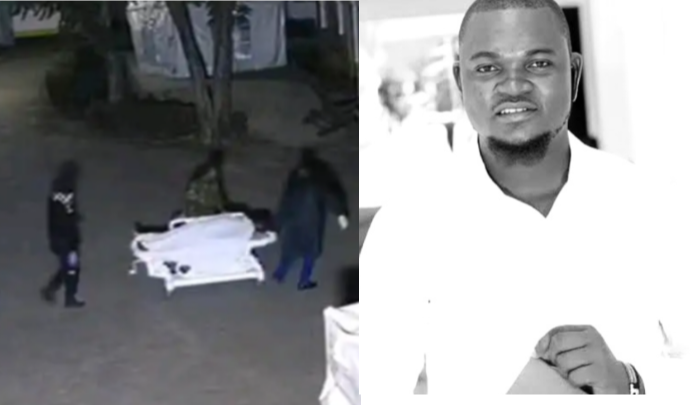The death of Albert Ojwang, a Kenyan blogger, has sparked national outrage and serious questions about police accountability.
The controversy began when Citizen TV Kenya aired CCTV footage from Mbagathi Hospital on June 14, 2025, showing police officers wheeling Ojwang’s lifeless body into the facility at 1:35 am on June 8.
This footage directly contradicted earlier claims by the Directorate of Criminal Investigations, who insisted that Ojwang was alive and in a police cell at that exact time. The video raised suspicions that his death may not have been natural or accidental, but instead a pre-planned killing covered up to look like a medical emergency.
The CCTV footage showed officers taking about 20 minutes to move the body from their vehicle to the emergency wing, showing no signs of urgency.
This led many people to believe they already knew Ojwang was dead. The behavior of the police, along with delays in sharing the truth and conflicting reports, has strengthened the theory that this was not just a case of police negligence but possibly a state-sanctioned execution.
Lawyer Wills Otieno described it as “a state-sanctioned execution wrapped in medical lies and surveillance manipulation.” This message has since been widely shared, reflecting how deeply the footage has shaken the public.
Veteran journalist John-Allan Namu also joined the conversation, saying the footage confirms Ojwang was already dead when taken to the hospital and accusing the DCI of lying. He referred to it as “premeditated murder,” saying this could not simply be brushed off as a mistake.
Other well-known public figures like Okiya Omtatah and Ayub Abdikadir have echoed these concerns, demanding justice and accountability. Social media has been flooded with angry posts, videos, and discussions calling for a full investigation and the immediate punishment of those responsible.
Following the public pressure, the Independent Policing Oversight Authority took action by arresting Samson Taalam, the Officer Commanding Station at Nairobi’s Central Police Station. He is currently held at Langata Police Station.
His lawyer, Danstan Omari, denied any connection to Ojwang’s death, claiming his client was being unfairly targeted. Despite this arrest, the public remains skeptical, with many people fearing that justice may once again be delayed or denied. They are calling for an independent investigation that goes beyond the police and includes neutral observers.
What makes this case even more serious is how it reflects a bigger problem in Kenya a police system often accused of brutality, cover-ups, and ignoring human rights.
Many people now believe that Ojwang’s death is not an isolated incident, but part of a pattern of abuse that needs to be stopped.
Questions like “Who signs off on such killings?” and “How many more deaths have been covered up as medical emergencies?” are now being asked loudly by Kenyans across the country. The fear is that without serious reform, more innocent lives could be lost under similar circumstances.
The release of the footage and the public response have made it clear that this case cannot be ignored.
The demand for transparency is stronger than ever. Kenyans want the truth, and they want those behind the alleged cover-up to be held responsible.
The death of Albert Ojwang has become more than just a case of one man it now symbolizes the fight for justice and honesty in a country where trust in law enforcement is at an all-time low. Until more facts are revealed and justice is served, this case will continue to stir anger, fear, and calls for real change.



